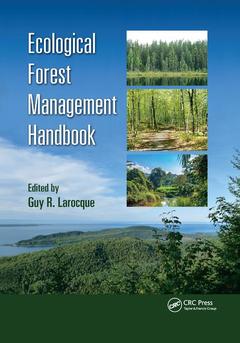Ecological Forest Management Handbook Applied Ecology and Environmental Management Series
Coordonnateur : Larocque Guy R.

Forests are valued not only for their economic potential, but also for the biodiversity they contain, the ecological services they provide, and the recreational, cultural, and spiritual opportunities they provide. The Ecological Forest Management Handbook provides a comprehensive summary of interrelated topics in the field, including management concepts, forest models, and ecological indicators.
Featuring contributions from experts on the three main forest types?boreal, temperate, and tropical?this book presents in-depth coverage of important issues in ecological forest management and includes case studies addressing ecological and socioeconomic issues. It illustrates how ecological forest management is a complex process that requires broad ecological knowledge while giving readers a deeper understanding of basic principles and applications.
FOREST MANAGEMENT CONCEPTS. Applying Knowledge of Natural Disturbance Regimes to Develop an Ecosystem Management Approach in Forestry. Triad Forest Management: Local Fix or Global Solution. Forest Wildlife Management. External Drivers of Changes Challenging Forestry: Political and Social Issues at Stake. Considerations of Ecosystem Services in Ecological Forest Management. FOREST MODELS. Growth and Yield Models for Predicting Tree and Stand Productivity. Forest Succession Models. Process-Based Models: A Synthesis of Models and Applications to Address Environmental and Management Issues. Modeling Forest Carbon Budgets toward Ecological Forest Management: Challenges and Future Directions. Modeling the Impacts of Pest Damage: Case Studies for Conifers in British Columbia, Canada. ECOLOGICAL INDICATORS. Assessing Abundance, Biomass, and Complexity in the Context of Ecological Forest Management. Considering Forest Biodiversity Indicators within a Pressure, State, Benefit, and Response Framework. Indicators of Forest Ecosystem Integrity. Criteria and Indicators of Sustainable Forest Management. Indicating Forest Ecosystem and Stand Productivity: From Deductive to Inductive Concepts. Turnover Times for Wood, Forest Litter, Roots, and Soil Organic Matter. Forest Ecosystem Health and Biotic Disturbances: Perspectives on Indicators and Management Approaches. ADDRESSING ECOLOGICAL AND SOCIOECONOMIC ISSUES. Application of Surface Modeling for Large Regions: A Case Study for Forest Carbon Stocks in China. Comprehensive Analysis of Land Tenure Effects on the Structure and Services of Regional Forest Ecosystems. Forest Management and Climate Change: Adaptive Measures for the Temperate–Boreal Interface of Eastern North America.
Dr. Guy R. Larocque is a research scientist for the Canadian Forest Service, a sector of Natural Resources Canada, at the Laurentian Forestry Centre, Québec City, Québec, Canada. He is also an adjunct professor in the Faculty of Natural Resources Management at Lakehead University, Thunder Bay, Ontario, Canada, and the Forest Research Institute at the University of Québec in Abitibi-Témiscamingue, Québec, Canada. He is a member of the editorial advisory board of Ecological Modelling and the International Journal of Forestry Research, and is also associate editor of Ecoscience. He has published papers on productivity and succession, carbon cycle, uncertainty analysis, and the development of empirical, succession (gap), and process-based models for forest ecosystems.
Date de parution : 09-2020
17.8x25.4 cm
Date de parution : 12-2015
17.8x25.4 cm
Thèmes d’Ecological Forest Management Handbook :
Mots-clés :
Forest Management; Boreal Forests; ecosystems; Balsam Fir; boreal; Ecological Forest Management; forests; Sustainable Forest Management; sustainable; Forest Ecosystem; temperate; MPB; natural; Nonwood Forest Products; disturbance; Silvicultural Treatments; coarse; Ecosystem Services; woody; Natural Disturbance; debris; Ar Bo; Bachman’s Sparrow; Tree Mortality; Forest Certification; SBW Outbreak; Silvicultural Regime; Ye Ar; British Columbia’s Southern Interior; White Pine Blister Rust; Blister Rust; Competition Indices; Conservation Zone; Central EUROPE; Stem Defects



